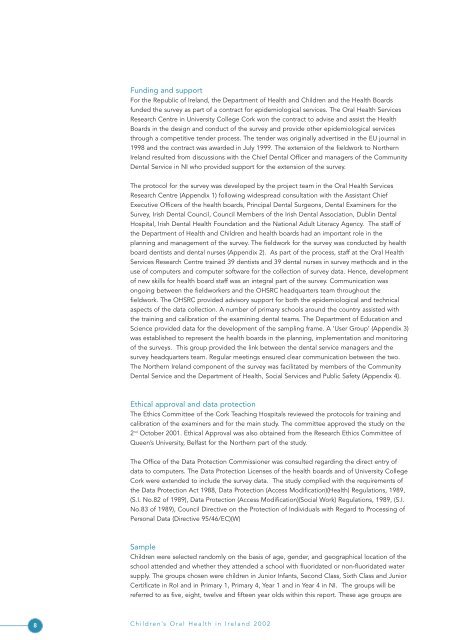Oral Health inside - Communities and Local Government
Oral Health inside - Communities and Local Government
Oral Health inside - Communities and Local Government
Create successful ePaper yourself
Turn your PDF publications into a flip-book with our unique Google optimized e-Paper software.
Funding <strong>and</strong> supportFor the Republic of Irel<strong>and</strong>, the Department of <strong>Health</strong> <strong>and</strong> Children <strong>and</strong> the <strong>Health</strong> Boardsfunded the survey as part of a contract for epidemiological services. The <strong>Oral</strong> <strong>Health</strong> ServicesResearch Centre in University College Cork won the contract to advise <strong>and</strong> assist the <strong>Health</strong>Boards in the design <strong>and</strong> conduct of the survey <strong>and</strong> provide other epidemiological servicesthrough a competitive tender process. The tender was originally advertised in the EU journal in1998 <strong>and</strong> the contract was awarded in July 1999. The extension of the fieldwork to NorthernIrel<strong>and</strong> resulted from discussions with the Chief Dental Officer <strong>and</strong> managers of the CommunityDental Service in NI who provided support for the extension of the survey.The protocol for the survey was developed by the project team in the <strong>Oral</strong> <strong>Health</strong> ServicesResearch Centre (Appendix 1) following widespread consultation with the Assistant ChiefExecutive Officers of the health boards, Principal Dental Surgeons, Dental Examiners for theSurvey, Irish Dental Council, Council Members of the Irish Dental Association, Dublin DentalHospital, Irish Dental <strong>Health</strong> Foundation <strong>and</strong> the National Adult Literacy Agency. The staff ofthe Department of <strong>Health</strong> <strong>and</strong> Children <strong>and</strong> health boards had an important role in theplanning <strong>and</strong> management of the survey. The fieldwork for the survey was conducted by healthboard dentists <strong>and</strong> dental nurses (Appendix 2). As part of the process, staff at the <strong>Oral</strong> <strong>Health</strong>Services Research Centre trained 39 dentists <strong>and</strong> 39 dental nurses in survey methods <strong>and</strong> in theuse of computers <strong>and</strong> computer software for the collection of survey data. Hence, developmentof new skills for health board staff was an integral part of the survey. Communication wasongoing between the fieldworkers <strong>and</strong> the OHSRC headquarters team throughout thefieldwork. The OHSRC provided advisory support for both the epidemiological <strong>and</strong> technicalaspects of the data collection. A number of primary schools around the country assisted withthe training <strong>and</strong> calibration of the examining dental teams. The Department of Education <strong>and</strong>Science provided data for the development of the sampling frame. A ‘User Group’ (Appendix 3)was established to represent the health boards in the planning, implementation <strong>and</strong> monitoringof the surveys. This group provided the link between the dental service managers <strong>and</strong> thesurvey headquarters team. Regular meetings ensured clear communication between the two.The Northern Irel<strong>and</strong> component of the survey was facilitated by members of the CommunityDental Service <strong>and</strong> the Department of <strong>Health</strong>, Social Services <strong>and</strong> Public Safety (Appendix 4).Ethical approval <strong>and</strong> data protectionThe Ethics Committee of the Cork Teaching Hospitals reviewed the protocols for training <strong>and</strong>calibration of the examiners <strong>and</strong> for the main study. The committee approved the study on the2 nd October 2001. Ethical Approval was also obtained from the Research Ethics Committee ofQueen’s University, Belfast for the Northern part of the study.The Office of the Data Protection Commissioner was consulted regarding the direct entry ofdata to computers. The Data Protection Licenses of the health boards <strong>and</strong> of University CollegeCork were extended to include the survey data. The study complied with the requirements ofthe Data Protection Act 1988, Data Protection (Access Modification)(<strong>Health</strong>) Regulations, 1989,(S.I. No.82 of 1989), Data Protection (Access Modification)(Social Work) Regulations, 1989, (S.I.No.83 of 1989), Council Directive on the Protection of Individuals with Regard to Processing ofPersonal Data (Directive 95/46/EC)(W)SampleChildren were selected r<strong>and</strong>omly on the basis of age, gender, <strong>and</strong> geographical location of theschool attended <strong>and</strong> whether they attended a school with fluoridated or non-fluoridated watersupply. The groups chosen were children in Junior Infants, Second Class, Sixth Class <strong>and</strong> JuniorCertificate in RoI <strong>and</strong> in Primary 1, Primary 4, Year 1 <strong>and</strong> in Year 4 in NI. The groups will bereferred to as five, eight, twelve <strong>and</strong> fifteen year olds within this report. These age groups are8 Children’s <strong>Oral</strong> <strong>Health</strong> in Irel<strong>and</strong> 2002
















